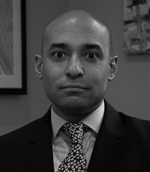Interview With 2017 ASH-AMFDP Award Recipient Roger Belizaire, MD, PhD

Roger Belizaire, MD, PhD, is a 2017 ASH-AMFDP Award recipient. He is a pathology instructor at Brigham and Women’s Hospital in Boston, Massachusetts.
How does the research you are currently working on tie into your professional interests?
As a transfusion medicine physician, numerous cases I see involve patients with transfusion-dependent myeloid diseases or graft-versus-host disease after allogeneic stem cell transplantation for a myeloid disease. Given the extensive genomic characterization of myeloid diseases that has occurred over the past decade, there’s now ample opportunity to identify oncogenic mechanisms and new therapeutic targets; this was the impetus for my current project examining CBL mutations in myelodysplastic and myeloproliferative neoplasms.
Who or what encouraged you to pursue hematology/pathology as subspecialties?
I knew that I wanted to pursue transfusion medicine after a great rotation through clinical pathology during medical school. I had studied immunology in graduate school and was eager to apply the basic principles in a clinical context. At the same time, new puzzles arose each day, forcing me to appreciate the many open questions in human immunology and transfusion medicine.
How do you believe being involved in research adds value to your practice as a physician? This can be value to you, your practice, or your patients.
I would say that most physician-scientists engage in research hoping to improve patient care; this is rarely an easy goal. On the other hand, I think that being involved in patient care guides research toward clinically relevant questions and practicable solutions.
What role does diversity play in your practice? How does your own background help inform your decisions when it comes to patient care?
Understanding and respecting that we have all had different experiences is essential. In seeking to build trust and communicate effectively, it is also important to view these differences as opportunities to learn and make progress. The most enriching interactions I’ve had with patients, co-workers, friends, and family have always come from a willingness to share these differences.
How important have mentors been to you throughout your medical journey? What advice would you give to an individual who is looking for the right mentor?
Mentors have been tremendously important in my development as a scientist and physician. I have been extremely lucky to work with people, all at different points in their respective careers, who were willing to take the time to mentor me; they have all been supportive of my path but have also challenged me to think differently. It’s difficult for me to describe the ideal mentor because I think that people thrive under different mentorship styles – one should definitely talk to multiple potential mentors (and their mentees) to find the best fit.
What would you like to contribute to the field? How will your participation as an ASH-AMFDP Award recipient help you reach your specific goals?
Ultimately, I would like my research to improve patient care; at this point, identifying effective, targeted therapies in myeloid disease is the primary goal. The ASH-AMFDP Award not only provides funding to help me achieve this goal, but it also provides support from an outstanding community of scientists and clinicians.